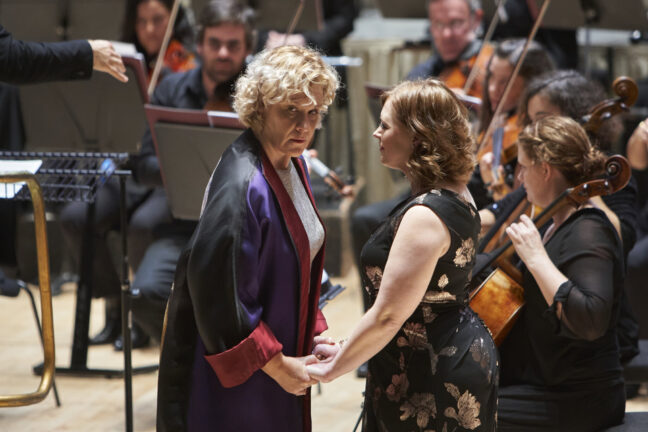 United Kingdom Gluck, Orfeo ed Euridice: Chorus and Orchestra of Opera North / Antony Hermus (conductor). The Lowry Theatre, Salford Quays. 18.11.2022. (MC)
United Kingdom Gluck, Orfeo ed Euridice: Chorus and Orchestra of Opera North / Antony Hermus (conductor). The Lowry Theatre, Salford Quays. 18.11.2022. (MC)

Production:
Director – Sophie Gilpin
Cast:
Orfeo – Alice Coote
Euridice – Fflur Wyn
Amore – Daisy Brown
Shepherds, Nymphs, Furies, Spirits etc. – Chorus of Opera North
This Opera North concert performance of Gluck’s Orfeo ed Euridice uses the legend of Orfeo or Orpheus. Unusually attractive and evocative, this is undoubtedly one of the greatest tragic love stories of all Greek mythology. This famous myth was the subject of one of the first ever operas and has proved enduringly popular with numerous musical theatre composers.
Opera North is a firm advocate for the Orfeo legend which it has used several times. This performance of Orfeo ed Euridice is part of a wider celebration in partnership with South Asian Arts staging a ‘re-imagining’ of Monteverdi’s Orpheus (1607) which mixes baroque opera and Indian classical music written by Jasdeep Singh Degun.
Gluck’s Orfeo ed Euridice using libretto by Ranieri Calzabigi based on the Orfeo legend, with the castrato Guadagni in the role of Orfeo, was premiered in 1762 at Vienna in the presence of Empress Maria Theresa. There are several versions of Gluck’s masterpiece and for this production Opera North chose to use the original Italian version.
Orfeo a poet, musician and singer marries the beautiful nymph Euridice who is bitten by a venomous snake and dies. Racked with grief and angry at the gods, Orfeo journeys into the underworld to rejoin his deceased wife. Orfeo’s appeal is granted by the god Jupiter, but with strings attached, as they leave together, he isn’t allowed to look at her until she is back living on earth.
Although Orfeo ed Euridice is described by Opera North as a ‘concert performance’ this is really a semi-staging, and a most effective one too. There are striking costumes for the three soloists, some modest stage props and a black backdrop with twinkling stars. Members of the Opera North chorus, all dressed in black, were the shepherds, furies, nymphs, and spirits. Acknowledgement is due to Sophie Gilpin who did a first-class job directing the limited stage and costume arrangements.
Standing out in the demanding trouser role of Orfeo was renowned mezzo-soprano Alice Coote. An experienced Orfeo, Coote’s performances for English National Opera back in 1999 were highly commended. Dressed in a kimono jacket over black trousers, Coote’s innate acting ability combining with her singing prowess and a wealth of stamina made for a captivating portrayal of the heartbroken hero. Striking was Coote’s singing of the arioso ‘Che puro ciel’ where in the underworld Orfeo is in awe of the purity of the light and alluring landscape. A true highlight was the affecting and melting beauty that Coote bestowed to ‘Che farò senza Euridice?’ as Orfeo expresses his profound grief in one of the most famous arias in all opera.
Soprano Fflur Wyn sang creditably as Euridice, a role with rather limited opportunities to shine. In the aria ‘Che fiero momento’ Euridice conveys her sorrow at Orfeo’s possible unfaithfulness and Wyn demonstrated her attributes of warm tone and agreeable levels of sincerity and expression. No stranger to the trouser role of Amore (god of love) soprano Daisy Brown was praised for singing the role at the Buxton Festival in 2014. Amore has the arias ‘Dalla cetra tua’ suggesting Orfeo goes to the underworld to obtain Euridice’s release from the gods and ‘Gli sguardi trattieni’ where Amore persuades Orfeo to rescue Euridice. Making the most of her opportunity Brown stood out for her clarity of delivery, fresh attractive tone and natural stage presence. Dressed in fitted red jacket and black trousers I did enjoy Brown’s appearances, sadly all too brief.
Opera North’s trio of soloists especially Alice Coote were most impressive as were the chorus and pared down orchestra directed by principal guest conductor Antony Hermus. My only problem lies with the opera Orfeo ed Euridice (or ‘theatrical action in music’) itself. As with many operas it is not alone for its longueurs; there are only so many times that the bereaved Orfeo can refer to his grief and sorrow before it loses some impact and becomes tedious.
Michael Cookson
